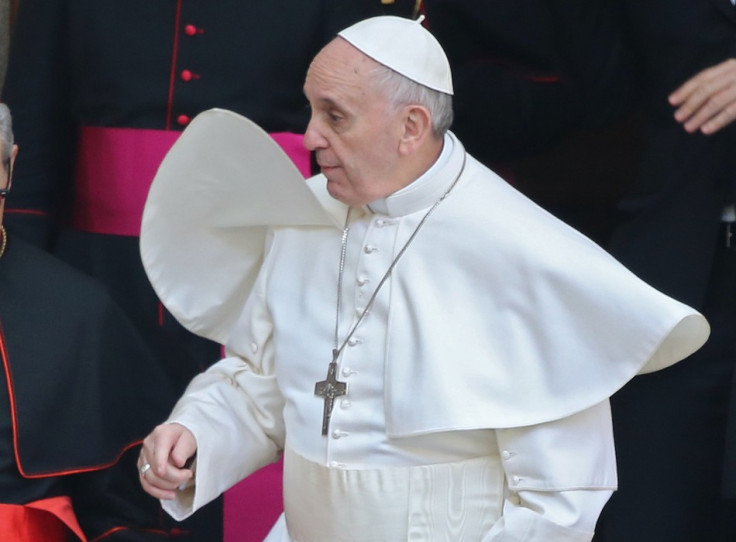Pope Francis: The Jesuit History of Suppression and Theology of Liberation

Cardinal Jorge Bergoglio is the first Jesuit to lead the Roman Catholic Church in its 2,000-year history. The largest religious order of men in the Church and the largest single order of Catholic priests, the Societas Jesu (Society of Jesus, as it is formally known) was founded in 1540 by the Basque military nobleman Ignazio Loyala, who later became a saint.
Just like today, the Catholic Church was in crisis between the Protestant schism who preached against the corruption in the Curia and factions pushing towards a humbler, reformed Church.
Officially recognised by Pius II, the Jesuits quickly became one of the most important factions in the Catholic Church, extending their aggressive influence from Europe to South America. They were the shock troops in the Church's resistance to the Protestant reformation and among the first missionaries to start schools, colleges and seminaries in every continent from India to the Andes.
The Black Pope
With a focus on education, poverty and blind obedience to the Pope, the Jesuits were often mocked as manipulative fanatics. Their most famous motto Perinde ac cadaver (Obey as dead body obeys) often triggered conspiracy theories. In Shakespeare and Elizabethan England, Jesuits were viewed with suspicion, accused of being responsible of plots, epidemic pests and so on. The General Superior of the order was often called "The Black Pope" because he manoeuvred the actual Pope as a puppeteer.
Another motto, "give me a child in his first seven years of life and I will show you the man", reveals the importance of education in the Society of Jesus. Indeed, the Jesuit-run Georgetown was the first American university and today there are 28 Jesuit universities and colleges in the US alone.
The Suppression
By the 18<sup>th century, Jesuits had become so influential, powerful and elitist that European courts panicked and started expelling the order from their territories. They were accused of fomenting social revolts, being agents of the Pope and moulding impressionable young minds. In 1767, Pope Clement XIV signed an act ordering the Suppression of the Society of Jesus, which was enforced in Catholic countries such as France, Spain and Portugal.
In 1814, Pope Pius VII restored the Jesuits after the first abdication of Napoleon Bonaparte. In the decades that followed, Jesuits were at the forefront of the Church's battle against modernity, secularism and Enlightenment.
The Theology of Liberation
In South America, though, things were different from the beginning. As the Oscar-nominated film The Mission depicts, Jesuits in Latin America have always been close to the poor tribal population enslaved and tortured by Spanish and Portuguese domination. Those positions were re-elaborated by Pedro Arrupe, General of the order from 1965 to 1983, who stressed the importance of combating poverty and achieve social justice as crucial points of the Society's mission.
Since the 1950s and 1960s, Jesuits priests put their emphasis on the radical movement of the Theology of Liberation, which is focused on a Marxist-like emancipation of oppressed people, particularly the deprived from their rich oppressors.
Jesuits from the liberation theology wanted to read Catholic teachings through the eyes of the poorest, subjected to political oppression and ill-treatement in the troubled South American continent. According to them, the Bible should be experienced from the perspective of the poor and the church should transform itself into a movement for those who are denied their rights as human beings.
Pope's ban
In the most dramatic episode of El Salvador's civil war, six Jesuit priests were shot dead by soldiers in 1989. They were targeted because they had pushed for negotiations between the government and left-wing rebels. The former Cuban dictator Fidel Castro himself had studied under the Jesuits for 12 years - although he later forced his former teachers to leave the country in 1961.
However, it was former Pope John Paul II who delivered the greatest blow to a movement which represented a glimmer of hope for the oppressed population of Latin America.
Accused of being too independent, leftist and political, the Polish pope punished its representatives with disciplinary actions, removed the movement's activists such as Leonardo Boff and Gustavo Gutierrez, and personally selected the successor to Arupe.
Despite a reputation for free-thinking and liberalism, Francis is at the other end of the spectrum on matters of doctrine, more in line with Pope John Paul II and Pope Emeritus Benedict XVI. Francis has spoken out strongly against gay marriage, denouncing it in 2010 as "an attempt to destroy God's plan".
Bergoglio is known for his accessibility and simplicity, in line with Jesuits' preaching. As cardinal he took the bus to work every day, sold his official residence and lived in a small apartment where he cooked for himself.
© Copyright IBTimes 2025. All rights reserved.






















